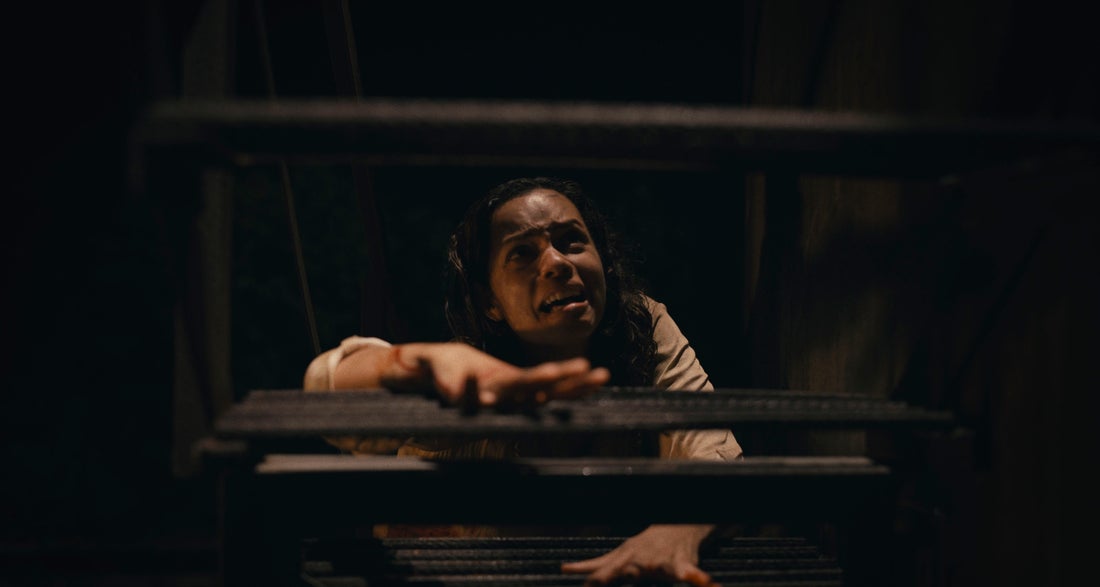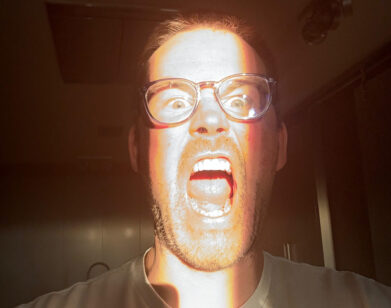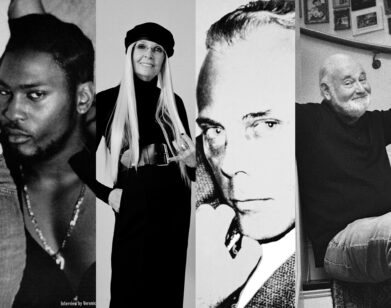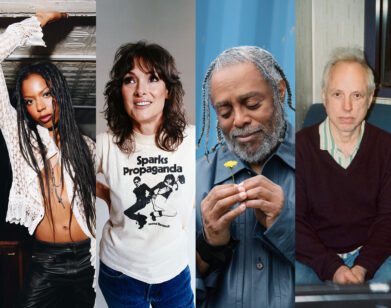MOVIES
Georgina Campbell on This Fall’s Surprise Horror Hit Barbarian
Barbarian, directed by Zach Cregger (of The Whitest Kids U’ Know fame) has received praise for its satirical eye, indulgent and shocking set pieces, and how enjoyable it is to watch it in a theater with an audience. However, there’s one specific scene—involving diary and maternal affection, without spoiling too much—that is so perverse and horrifying that it’s nearly impossible to watch without squinting through the gaps in your fingers. The runaway star of that scene—and the film itself—is Georgina Campbell, the British actor who plays Tess, a woman who ends up in a double-booked AirBnb with Keith (Bill Skarsgård). Things get much worse from there, and throughout the film, Campbell defies popular conventions and tropes of what it means to be a woman in a horror film; even through abjectly horrifying situations, Campbell’s character conducts herself with an equal blend of comedic flair and fierce conviction. We sat down with the 30-year-old BAFTA-winning actor to discuss her role in the movie, her love for horror films, and why Barbarian is a breath of fresh air.
———
JACKSON WALD: How did you come across the script, and your first initial reaction when reading it?
GEORGINA CAMPBELL: Ah, yeah, I got sent the script by my American agent. I already actually had a job that was planned for that period of time, but he sent me the script and said, “Just give it a look. I think it’s going to be something really good.” So I started reading it and was just completely blown away by it. I thought it was brilliant. It was very strange, funny, well-written, and had a very odd tone to it. Then I spoke to my agents about it and told them that I loved it, and luckily, I hadn’t got too far down the line on the other job, so I was able to switch and decided to go all in on Zach’s film. At the time, it was a scary decision. You have no idea how a project’s going to turn out, so it’s sometimes very hard to choose which projects you want to go for. It’s like a catch-22, half the time you’ve got nothing going on, and then suddenly, you have maybe two jobs that pop up and you have to choose. And I’m very glad that I chose this one.
WALD: Had you ever done a horror movie before?
CAMPBELL: I hadn’t done horror before, and I’ve always really wanted to do horror. I love horror films. I’ve done a lot of thrillers and dramas and quite intense work. I tend to go on projects where I’m playing complicated women going through quite hard circumstances. So that side of it, I was ready for. Zach had seen some of my work, so he knew that I could handle the more intense sides of doing a horror. But I didn’t really realize actually how fun it would be. As soon as you get into the genre of it and how elevated it is, it makes the acting side of it a lot more fun. It’s not your straight drama, it’s this elevated outrageous scenario.
WALD: How did you, as an actor, strike a balance between selling this very real and fairly relatable character, and also being someone who, as we see in the movie, feels compelled to make these irrational, complicated decisions?
CAMPBELL: A lot of it came from the script. Zach wrote it very well in that he tries to prevent it from seeming like she’s making stupid decisions again and again. He writes her as an intelligent character, who keeps trying to get out of situations but comes up against things again and again and again that stop her from being able to leave. And then personally, I really like naturalistic acting. I didn’t go to drama school. I’ve never really learned how to act apart from doing it as I’ve gone through job to job to job. So, I think a lot of my acting comes from instincts and my own experiences. And because the film is so elevated, and because there are lots of things that happen in the film that feel sometimes otherworldly, it was really key to make sure that Tess felt very grounded and was reacting to everything in a very grounded, realistic way to stop things from getting too over the top.
WALD: Totally. One thing I keep seeing online is people describing the film as a breath of fresh air, especially in the horror genre. Why do you think Barbarian, as opposed to maybe other horror movies coming out today, is really resonating with horror fans?
CAMPBELL: I love horror, and whenever new horrors come out, I always want to go and see them. I feel like this is a period of time where horror fans really get to try lots of different horror films, and there’s just a smorgasbord of all sorts of horror films that are coming out. I think this one, in particular, is very original. Lots of people say it harkens back to the ’80s and the B-movie and video nasties, and it’s got this tongue-in-cheek feeling to it. And I think it’s just fun. It’s scary and it’s fun. And when we look at directors and writers like Jordan Peele, that’s what he’s managed to crack, is making a horror film that’s both well written, scary and funny. And those two feelings work so well together because you can scare someone more if you’ve given them the levity and the humor. You allow people to have a breath to laugh, and then you’ll manage to hit them over the head even harder with a scare.
WALD: What was it like for you to watch the first real cut of it after all the editing was done?
CAMPBELL: It was really exciting. I knew how important this job was for me and for my career, and in general. I was working with an amazing writer-director. I was working with amazing actors that are really on the top of their game. And I knew that I had to work really, really hard to make sure that I deserved the role. Every time you get given a role, you then have to prove that they made the right choice. And it was quite stressful sometimes because I put a lot of pressure on myself — because I wanted to make sure that I did the part justice and I did the film justice. So when I saw the first cut with Zach, me and Justin Long and his partner, and my partner, Zach was really excited and giddy to show us. I was just blown away. It was such a lovely experience. And I knew that the film was good. I knew from reading it that it was good. I knew during making it that they were making something really special. But finally seeing it, it was quite emotional. And everything worked—those crazy moments where there’s a big twist or they move to a different character or these moments that, in the script, we were like, “Is it going to work, is it not?” They did work. It’s hard as an actor to watch yourself sometimes, because you’re looking at yourself and you’re thinking, ” I should’ve done this, or I should’ve done that.” And there were those moments as I was watching it, but I was able to let go and just enjoy the film
WALD: Is there one scene in particular, that while you were working on it, encapsulates the entire shooting process?
CAMPBELL: I found the final scene of the movie really hard actually because there’s just so much pressure of making sure that that final moment works and is engaging. And we were working on night shoots and in that scene, in particular, we didn’t have much time. So everyone was stressed, everyone knew we need to get it done. And at the time, I remember feeling that I came away from it and I was really upset, because I thought I didn’t get it, and that it didn’t work. And when I watched it, there’s another actor—Matthew [Patrick Davis]—that’s in that final scene. I don’t want to ruin it for anyone, but when I watched it, I realized that, really, it was his moment. He does such an amazing job, and I felt just a rush of relief. I realized, “Oh, you don’t have to worry about every single moment because some moments are your own characters and some moments are other people’s characters.” That was quite formative being able to have that experience and then watch the film and be able to step outside myself.
WALD: In terms of all the social commentary in the movie, one of the most obvious is that of masculinity, and how each of the men in the film exercises it, to varying degrees.
CAMPBELL: Yeah. It’s so interesting because you have three really male figures that you follow, and then you have two female characters and I’m one of them. And I think Tess comes in and you have that interesting relationship between her and Keith at the beginning of the film. Maybe you think he’s a bad guy, maybe you don’t really know, but they have completely different responses to things. As a woman, she feels fear of a certain situation—when she goes down into the basement and she sees a collection of things in the room. A bed, a bucket, and a camera. And he has a completely different response because it wouldn’t have the same effect perhaps on a man, as it would on a woman. And then, obviously, you have Justin Long’s character, AJ, who’s this truly despicable human being. And I think Justin has said that he believes that he’s the barbarian, which I think he could be. And then, also, there’s another male character in it that I obviously don’t want to go into too much, because I don’t want to spoil it.
Obviously, people have talked about, there are different things that Zach is dealing with. There’s #MeToo, there’s toxic masculinity, and there’s gender politics, but I think he’s managed to do it in a way where he is not beating anyone over the head with an agenda. He brings up these conversations within the film, and then as an audience, you are able to go away and think about it and decide what you think about it. And I think he also manages to give a lightness to some of these topics because of the humor that he puts into it. Especially AJ’s character. AJ is such a despicable, really horrible, grotesque character, who does really awful things, but he and Justin managed to create a character that was very funny. And not funny as in you’re laughing with him funny, because you’re laughing at him. We know he’s a bad guy, he doesn’t get retribution, but there’s a lightness that he puts into it, which stops it from feeling overwhelming to watch. And I just think he did that really well.







